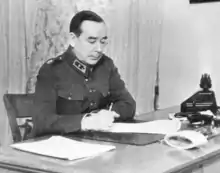Woldemar Hägglund
Johan Woldemar Hägglund (August 10, 1893 – February 12, 1963) was a lieutenant general in the Finnish Army in the Second World War, and an early volunteer in the Finnish Jäger troops in the Finnish Civil War 1918.

Early years
Hägglund went to school in Vyborg and studied civil engineering for four terms at the Helsinki University of Technology. In 1915, he was one of the first young men who volunteered to go to Germany to learn military skills to fight later for the independence of Finland from the Russian Empire. They joined the Finnish 27th Jäger Battalion Königlich Preussisches Jägerbataillon Nr. 27. He gained battle experience in the First World War on the Eastern Front of Germany in battles at the Lielupe River and the Gulf of Riga. Towards the end of his training, Hägglund also studied in Sweden.
Civil war
Hägglund returned to Finland on November 17, 1917, and as a group leader smuggling explosives and weapons, which he hid in Vyborg. He trained local troops, and was in charge of the first organised White military unit, which led a campaign in Karelia in 26 January 1918. In the last battle of the war, the Battle of Vyborg, he was the assistant to Aarne Sihvo.
Between the World Wars
During the 1920s and 30s, Hägglund remained in the army and spent some years in Sweden studying in the Military Academy. He eventually married and had three children, of whom his youngest son Gustav Hägglund (born 1938) became a general and Chief of Defence.
Second World War
In the Winter War, Hägglund was the commander of the Finnish IV Corps. In command during the Battle of Kollaa during the Winter War, General Hägglund is remembered for the quote, "Will Kollaa hold? (Kestääkö Kollaa?)", to which Lieutenant Aarne Juutilainen replied: "Yes it will hold, unless we are told to run."